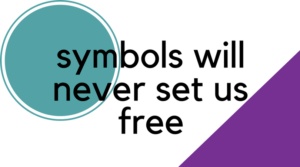
I’ve spent a lot of time studying movements. What made them successful, where did they come up short? It’s crucial to use our history to inform how we work toward liberation now.
To say that the Women’s March last year and this year prompted a lot of reflection for me would be an understatement.
Walking alongside someone is not always the same as walking with them.
The day after the march I wrote this as my daily “Dear Sister, not just cis-ter” post,
“Symbols are never more important than people or analysis.”
The symbols that have come to represent the Women’s March or feminism in general are by their nature problematic and exclusionary. We use symbols as a shortcut to find those “like us” –a way to ID others with shared values. To connect to our people. A sociologist friend told me the other day that people NEED symbols, it’s why we have flags, crosses, stars and crescents.
But in doing so it becomes easy to negate the deeper, more complex and nuanced conversations about ways in which we are different, and how exploring those differences, even if uncomfortable, make us, and make our movements stronger.
Investing in those conversations is how the members of a movement develop analysis.
Symbols without analysis and self exploration cause more harm than good.
Symbols can be co-opted, used to make make quick buck, symbols live on the surface, but hard won personal and collective analysis is what changes people and changes systems.
I do not know of any symbol which has not had the ability to become weaponized.
Without a rich analysis we will continue to get feminism wrong, continue to exclude people and ideas that would make the movement stronger, more inclusive, more equitable.
We can create the movement that we need for all of us, but we can not use simple representations for complex, multidimensional social realities.
They will never work.
There is no secret handshake that will let you in the club, no pass go to collect “wokeness.” We have to do the deep work or we will only ever have a recipe for “feminism lite.”
If it ain’t for all of us, it ain’t for none of us.
I am committed to do the work to get it right, I hope you are too.
This is how we get free.
If you want to do the work in-person with a multi-racial group of folks committed to being intersectional in their personal and professional lives you can join us in March for Tune Up.
I’d love to have you there.
